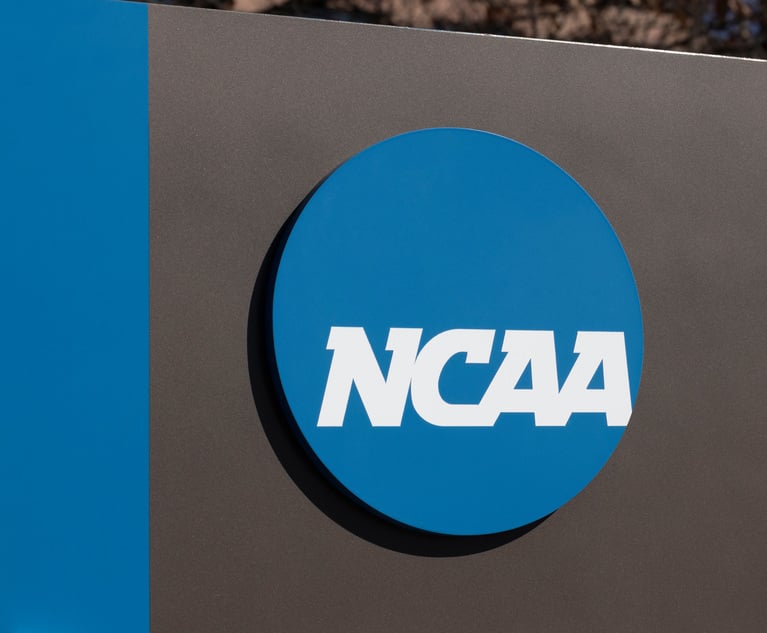Judge Criticizes Porn Company's Frequently Filed Copyright Suits
The court "sees no reason why it should be consciously wrong today because it was unconsciously wrong yesterday," U.S. Magistrate Judge Joel Schneider of the District of New Jersey said.
October 31, 2019 at 05:53 PM
5 minute read
 Joel Schneider is a federal magistrate judge for the U.S. District Court for the District of New Jersey.
Joel Schneider is a federal magistrate judge for the U.S. District Court for the District of New Jersey.Litigation tactics employed by a frequent filer of copyright infringement suits faced heavy criticism in a new ruling by a federal judge in New Jersey.
Prejudice to defendants and the administration of justice outweigh the interest of plaintiff Strike 3 Holdings in obtaining expedited discovery in a group of piracy suits against John Doe defendants, U.S. Magistrate Judge Joel Schneider of the District of New Jersey ruled Oct. 24. Although expedited discovery has been granted to Strike 3 and other repeat copyright litigants in the past, new case law has been published and the court has learned of new material information that was not previously presented, Schneider said.
Expedited discovery has been granted under prior cases with similar circumstances, but parties filing those cases should know they can no longer expect business as usual, Schneider said.
The court "sees no reason why it should be consciously wrong today because it was unconsciously wrong yesterday," Schneider said.
The suits allege that John Doe defendants illegally downloaded adult films owned by Strike 3 Holdings. Since it began filing copyright suits in 2017, Strike 3 has filed over 3,000 complaints nationwide. As of June, it had filed 311 cases in New Jersey, but more than half of the cases, 161, have been dismissed without prejudice for various reasons.
Schneider said he was prompted to take a closer look at Strike 3′s tactics after U.S. District Judge Royce Lamberth of the District of Columbia issued a blistering opinion against that company in December 2018. Lamberth, in denying Strike 3′s motion for expedited discovery, called it a "copyright troll," using technology that is "famously flawed," of preying on "low-hanging fruit" and flooding the courthouse "with lawsuits smacking of extortion."
After conducting his own review, Schneider found that Strike 3′s John Doe complaints name the unidentified IP subscriber as the defendant, even though the company admits it does not know who infringed its works.
"Despite its admitted lack of knowledge of who downloaded its works, whether the subscriber lives at the identified address, and who lives at the address, Strike 3′s complaints unequivocally aver in conclusory fashion that the listed subscriber to the identified IP address directly infringed its copyrights," Schneider wrote.
Strike 3 files John Doe complaints against unnamed parties linked to an IP address that the company says was connected to an infringer on a network called BitTorrent, which allows users to download, copy and distribute Strike 3′s videos. After filing the complaint, Strike 3 moves for expedited discovery on the internet service provider associated with the IP address. After receiving the name of the subscriber associated with the IP address, Strike 3 either settles the case, dismisses it or amends the complaint to name the specific subscriber.
Schneider concluded that, as pleaded, Strike 3′s complaints are futile because they do not pass muster under Fed. R. Civ. P. 12(b)(6). And even if Strike 3 did plead a cognizable claim for infringement, the court would deny its requests for discovery, he said.
Schneider said Strike 3 bases its complaints on unequivocal affirmative representations of alleged fact that it does not know to be true. In addition, its subpoenas are misleading and create too great of an opportunity for misidentification, and its claim that expedited discovery is the only way to stop infringement of its works is incorrect, he said. Schneider added that other means are available to stop infringement besides suing individual subscribers in thousands of John Doe complaints, and the deterrent effect of those suits is questionable, he said.
In addition, substantial prejudice might inure to subscribers who are misidentified, and Strike 3 underestimates the substantial interest subscribers have in the constitutionally protected privacy of their subscription information.
Strike 3 argues that its complaints pass muster because it is plausible the IP subscriber was the infringer, despite its lack of knowledge of who downloaded its works. But Schneider disagreed, citing Cobbler Nevada v. Gonzales, a 2018 decision from the Ninth Circuit holding that a direct infringement claim based on a defendant's status as registered subscriber of an IP address failed, because that status alone "does not create a reasonable inference that he is also the infringer."
Schneider acknowledged that the ruling might make it harder for Strike 3 to identify infringers. "To the extent this is the price to pay to assure compliance with the applicable law, so be it. A legal remedy does not exist for every wrong, and it is unfortunately the case that sometimes the law has not yet caught up with advanced technology," he said.
John Atkin of The Atkin Firm in Morristown, who represents Strike 3 alongside Los Angeles attorney Lincoln Bandlow, said he plans to appeal the ruling.
This content has been archived. It is available through our partners, LexisNexis® and Bloomberg Law.
To view this content, please continue to their sites.
Not a Lexis Subscriber?
Subscribe Now
Not a Bloomberg Law Subscriber?
Subscribe Now
NOT FOR REPRINT
© 2024 ALM Global, LLC, All Rights Reserved. Request academic re-use from www.copyright.com. All other uses, submit a request to [email protected]. For more information visit Asset & Logo Licensing.
You Might Like
View All
Sports Attorney Rejoins Jets for Second Tour of Duty as GC


Judge Extinguishes Suit Seeking Ban on Smoking in Atlantic City Casinos
5 minute read
Third Circuit Ruling Saying College Athletes Can Be Employees Leaves 'Lots of Open Questions'
Trending Stories
- 1Call for Nominations: Elite Trial Lawyers 2025
- 2Senate Judiciary Dems Release Report on Supreme Court Ethics
- 3Senate Confirms Last 2 of Biden's California Judicial Nominees
- 4Morrison & Foerster Doles Out Year-End and Special Bonuses, Raises Base Compensation for Associates
- 5Tom Girardi to Surrender to Federal Authorities on Jan. 7
Who Got The Work
Michael G. Bongiorno, Andrew Scott Dulberg and Elizabeth E. Driscoll from Wilmer Cutler Pickering Hale and Dorr have stepped in to represent Symbotic Inc., an A.I.-enabled technology platform that focuses on increasing supply chain efficiency, and other defendants in a pending shareholder derivative lawsuit. The case, filed Oct. 2 in Massachusetts District Court by the Brown Law Firm on behalf of Stephen Austen, accuses certain officers and directors of misleading investors in regard to Symbotic's potential for margin growth by failing to disclose that the company was not equipped to timely deploy its systems or manage expenses through project delays. The case, assigned to U.S. District Judge Nathaniel M. Gorton, is 1:24-cv-12522, Austen v. Cohen et al.
Who Got The Work
Edmund Polubinski and Marie Killmond of Davis Polk & Wardwell have entered appearances for data platform software development company MongoDB and other defendants in a pending shareholder derivative lawsuit. The action, filed Oct. 7 in New York Southern District Court by the Brown Law Firm, accuses the company's directors and/or officers of falsely expressing confidence in the company’s restructuring of its sales incentive plan and downplaying the severity of decreases in its upfront commitments. The case is 1:24-cv-07594, Roy v. Ittycheria et al.
Who Got The Work
Amy O. Bruchs and Kurt F. Ellison of Michael Best & Friedrich have entered appearances for Epic Systems Corp. in a pending employment discrimination lawsuit. The suit was filed Sept. 7 in Wisconsin Western District Court by Levine Eisberner LLC and Siri & Glimstad on behalf of a project manager who claims that he was wrongfully terminated after applying for a religious exemption to the defendant's COVID-19 vaccine mandate. The case, assigned to U.S. Magistrate Judge Anita Marie Boor, is 3:24-cv-00630, Secker, Nathan v. Epic Systems Corporation.
Who Got The Work
David X. Sullivan, Thomas J. Finn and Gregory A. Hall from McCarter & English have entered appearances for Sunrun Installation Services in a pending civil rights lawsuit. The complaint was filed Sept. 4 in Connecticut District Court by attorney Robert M. Berke on behalf of former employee George Edward Steins, who was arrested and charged with employing an unregistered home improvement salesperson. The complaint alleges that had Sunrun informed the Connecticut Department of Consumer Protection that the plaintiff's employment had ended in 2017 and that he no longer held Sunrun's home improvement contractor license, he would not have been hit with charges, which were dismissed in May 2024. The case, assigned to U.S. District Judge Jeffrey A. Meyer, is 3:24-cv-01423, Steins v. Sunrun, Inc. et al.
Who Got The Work
Greenberg Traurig shareholder Joshua L. Raskin has entered an appearance for boohoo.com UK Ltd. in a pending patent infringement lawsuit. The suit, filed Sept. 3 in Texas Eastern District Court by Rozier Hardt McDonough on behalf of Alto Dynamics, asserts five patents related to an online shopping platform. The case, assigned to U.S. District Judge Rodney Gilstrap, is 2:24-cv-00719, Alto Dynamics, LLC v. boohoo.com UK Limited.
Featured Firms
Law Offices of Gary Martin Hays & Associates, P.C.
(470) 294-1674
Law Offices of Mark E. Salomone
(857) 444-6468
Smith & Hassler
(713) 739-1250






